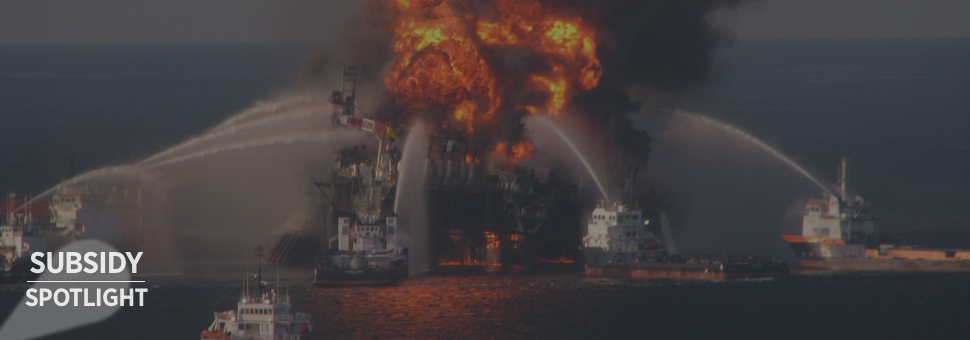
Subsidy Spotlight: Paid to Pollute and Poison
The BP gulf oil spill may not have happened without government subsidies. In fact, at least two major subsidies were used both before and after the explosion of the Deepwater Horizon to support BP.
A wife and mother of two from Venice, Louisiana, Kindra Arnesen says her life can be divided into two chapters: before April 20, 2010, and after. On that evening, an oil well located several miles off the coast of Louisiana discharged large bubbles of gas which traveled a mile to the surface before igniting, destroying the oil rig and killing eleven men. Thus began the worst marine oil spill in history and America’s largest environmental disaster, with hundreds of millions of gallons of oil eventually spilling into the Gulf of Mexico.
Four years later, residents from surrounding communities claim they still struggle with the health problems caused by the BP oil spill. “You just learn to live sick,” says Arnesen, who complains of headaches and unexplained rashes that won’t go away.
Her husband, who was hired by BP to help clean up the spill, has it much worse.
A fisherman in his mid-forties, his life has not been the same. He struggles to go to work and every month he is laid low by headaches, respiratory problems, and general weakness. “I roll over at night sometimes to see if he is still breathing,” Kindra says. “It’s really scary.”
The impact of exposure to oil from the Deepwater Horizon spill on people’s wellbeing has been documented by numerous government-sponsored studies. After seven fishermen hired for oil spill cleanup were hospitalized, the National Institutes of Occupational Safety and Health (NIOSH) examined possible health effects of the spill. Because of the wide variety of working conditions, differing levels of exposures, and confounding problems from heat, the agency’s conclusions, released in August 2011, remain rather vague. During the summer of 2010, the Institute of Medicine (IOM) held a workshop to assess the effects on people and attempted to identify high risk populations for future health concerns.
But science places a high value on controlling for variables when drawing conclusions. It has been difficult if not impossible to place direct blame on the oil spill for each individual’s health problems. Exposures to oil were not carefully measured. For all intents, people who were exposed have become involved in an uncontrolled medical experiment.
However, what is certainly well documented, yet much less publicized, is that the likelihood of this disaster was certainly encouraged by tax policies created in Washington. According to Oil Change International’s latest report, federal and state subsidies to the oil, gas, and coal industries result in a $21 billion windfall for carbon polluting companies every year. This occurs at a time when the biggest five oil companies are earning record profits, close to $93 billion last year, or $177,000 per minute. And according to corporate documents, risky drilling projects like those undertaken by BP would most likely never occur without this type of corporate welfare.
HANDOUTS TO THE RICH
The charge that this oil spill would probably not have happened without government largesse is fact, not supposition. There are in fact at least two major subsidies that BP took advantage of both before and after the explosion of the Deepwater Horizon.
When a spill happens, it is not the companies that pay, but rather the taxpayers. A tax deduction for oil spill remediation costs allows companies to deduct costs of oil spill clean-up from tax payments as a “standard business expense”. The most notable example occurred in 2010 when BP claimed a $9.9 billion tax deduction due to clean-up costs for the Deepwater Horizon blowout and resulting oil spill in the Gulf of Mexico.
A second subsidy responsible for increased offshore drilling is not only employed in case of an accident, but rather is a regular part of the oil business. Drilling expenditures, which result in billions of oil industry costs annually, are handled by current tax law in such a way to give a break to oil companies in order to recover these costs quickly. Intangible drilling costs include wages, fuel, and repairs and in 2013 the federal government provided about $3.5 billion in support through intangible drilling cost recovery.
The main lobbying group for the oil industry has argued that without this tax break, most offshore oil drilling would not be economically feasible. According to research published in July 2013 by the American Petroleum Institute (API), the tax deduction for intangible drilling costs represent about 60 to 90% of a well’s total costs. Because deep offshore oil wells, like the one run by BP, are so far out at sea, they are much more expensive to operate and drilling expenses consume about 80% of total costs. Without this tax break, API says, many “projects will no longer meet investment criteria” and will not be drilled.
The IRS has provided companies with the ability to write off these expenses since 1918, when climate change and the social costs of oil drilling were barely on the radar. API’s analysis finds that one of the areas most helped by current tax law is drilling in deep waters off the Gulf of Mexico. The industry argues that drilling in deep water is much more costly and removing the tax break for intangible drilling costs would not only reduce the number of oil rigs in the deep waters of the Gulf but could also curtail exploration for future oil wells.
This type of tax deduction arguably made sense in 1918, for a fledgling industry that was struggling to establish itself, and needed government help to defray upfront costs. But if an activity is too costly and risky for one of the wealthiest industries on the planet to undertake without government assistance, one wonders if it is indeed a wise use of public funds.
It should be noted that in every single budget that President Obama has sent to Capitol Hill for approval, this subsidy has been marked for removal. And yet, Republicans and oil industry donation soaked Democrats (like those in Louisiana) have successfully defended the industry from this and other common sense reforms.
API estimates that removing just this one tax subsidy would eventually cause 3,000 fewer wells to be drilled every year in the Gulf. This seems somewhat unlikely, given that the oil industry clearly has the capital available to devote to new wells should they choose to spend their money in that way.
Even if it was true though, the reduction in drilling would help keep carbon in the ground and dramatically lower the possibility of another environmental disaster in Louisiana. Last and certainly not least, removing the subsidy would help ensure that more families like the Arnesens do not suffer.
HIDDEN COSTS OF CORPORATE WELFARE
“We’re still seeing oil coming in during storms,” says Cherri Foytlin, a former features writer for a now shuttered newspaper that was run out of the small town of Rayne, Louisiana. Foytlin began reporting on the spill as soon as it happened and says most of the country never really understood how bad things were for people along the coast because BP and the government controlled much of the press, staging media events in areas that saw the least damage.
Residents are still sick and it’s hard to prove why. At every turn, she says, people have been ignored. “It’s hard to pin down the causation and BP knows that,” she says. “But we have health problems that weren’t here before the spill.”
Fed up with how the government and BP were handling the issue, Foytlin marched from her tiny town in Louisiana to Washington, DC to raise awareness of people’s plight in her home state. She has now become active in other fights against the oil industry, recently turning her attention to activism against the Keystone XL pipeline. One problem she has noticed is that politicians won’t stand up to oil companies because the industry is too economically powerful.
Foytlin believes most workers in the oil industry care about the environment, but they are stuck working for company executives that don’t. “The oil industry buys off our politicians. You can’t get elected in the state of Louisiana without oil money or you’ll have a shadow cast over your every move,” said Foytlin.
Foytlin’s concern about the oil industry exercising control over the government is borne out by data and media reports. Last year, oil and gas companies spent $144 million lobbying in Washington. In addition to hiring high-priced lobbyists, this industry consistently provides millions in campaign contributions to candidates for elected office as well. Senator Landrieu of Louisiana has received some $1.5 million in fossil fuel industry contributions alone.
The money spent buying influence pays off in spades for the industry. In early June, Louisiana Governor Bobby Jindal signed a bill to protect oil and gas companies from lawsuits by people harmed by the industry. The state’s Attorney General is now concerned that this could let BP off the hook from paying people hurt by the oil spill.
Meanwhile, life in the shadow of the industry can change in a heartbeat. Arnesen says that before the spill she never really paid attention to the news, never followed what was happening in politics. Her worldview was pretty simple: live life “and work my ass off.”
And she is angry that tax breaks help to fund the industry’s oil exploration and development in Louisiana. “There’s no excuse for what the oil and gas industry has done to our state. We could be the state of green jobs, but they are here for the long term and they don’t take responsibility. They have made our land, fishing, and health unsustainable.”





